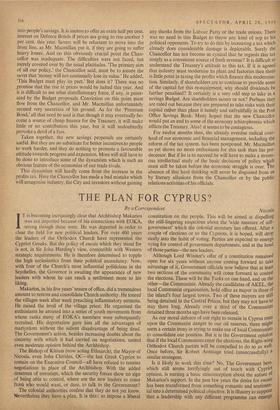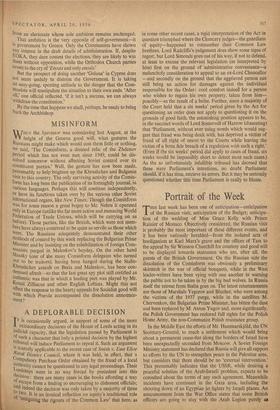THE PLAN FOR CYPRUS?
IT is becoming increasingly clear that Archbishop Makarios was not deported because of his connections with EOKA, strong though these were. He was deported in order to clear the field for new political leaders. For over 400 years the leaders of the OrthodOx Church have represented the Cypriot Greeks. But the policy of enosis which they stand for is not, in Sir John Harding's view, compatible with Western strategic requirements. He is therefore determined to topple the high ecclesiastics from their political ascendancy. Now, with four of the Church's most influential politicians in the Seychelles, the Governor is awaiting the appearance of new leaders with whom he can reach a settlement more to his liking.
Makarios, in his five years' tenure of office, did a tremendous amount to restore and consolidate Church authority. He toured the villages week after week preaching inflammatory sermons. He raised the level of the village priest. He organised the enthusiasm he aroused into a series of youth movements from whose ranks many of EOKA's members were subsequently recruited. His deportation gave him all the advantages of martyrdom without the salient disadvantage of being dead. The Government's action, besides increasing doubts about the sincerity with which it had carried on negotiations, united even moderate opinion behind the Archbishop.
The Bishop of Kitium (now acting Ethnarch), the Mayor of Nieosia, even John Clerides, QC—the last Greek Cypriot to remain on the Executive Council—all have refused to resume negotiations in place of the Archbishop. With the added deterrent of terrorism, which the security forces show no sign of being able to control, where are the new leaders to come from who would want, or dare, to talk to the Government?
The colonial authorities confess that they do not yet know. Nevertheless they have a plan. It is this : to impose a liberal constitution on the people. This will be aimed at dispelling the still-lingering suspicions about the 'wide measure of self- government' which the colonial secretary has offered. After a couple of elections or so the Cypriots, it is hoped, will drop easily into the habit of voting. Parties are expected to emerge vying for control of government departments, and at the head of those parties—the new leaders. Although Lord Winster's offer of a constitution remained open for six years without anyone coming forward to take advantage of it, Government officials now believe that at least two sections of the community will come forward to contest the elections. These will be the Turks on one hand, and on the other—the Communists. Already the candidates of AKEL, the local Communist organisation, hold office as mayor in three of the island's four largest towns. Two of these mayors are still being detained in the Central Prison, but they may not have to stay there long. Already over a third of the Communists detained three months ago have been released.
As our moral defence of our right to remain in Cyprus rests upon the Communist danger to our oil reserves, there might seem a certain irony in trying to make use of local Communists to consolidate our position. But it is the Government opinion that if the local Communists enter the elections, the Right-wing Orthodox Church parties will be compelled to do so as well. Once before, Sir Robert Armitage tried (unsuccessfully) a similar strategem.
Is it likely to work this time? No. The Government here• which still seems terrifyingly out of touch with Cypriot opinion, is nursing a basic misconception about the nature of I4akarios's support. In the past few years the desire for enosis has been transformed from something romantic and sentimen- tal into a determined political objective. It is illusory to suppose that a leadership with any different programme can emerge from an electorate whose sole ambition remains unchanged. That ambition is the very opposite of self-government—it is government by Greece. Only the Communists have shown any interest in the drab details of administration. If, despite EOKA, they dare contest the elections, they are likely to win them without opposition, while the Orthodox Church parties revert to the cry of 'Enosis and only enosis.' But the prospect of doing another 'Guiana' in Cyprus does not seem unduly to distress the Government. It is taking an easy-going, sporting attitude to the danger that the Com- munists will manipulate the situation to their own ends. 'After all,' one official reflected, 'if it isn't a success, we can always withdraw the constitution.
By the time that happens we shall, perhaps, be ready to bring back the Archbishop.



















































 Previous page
Previous page